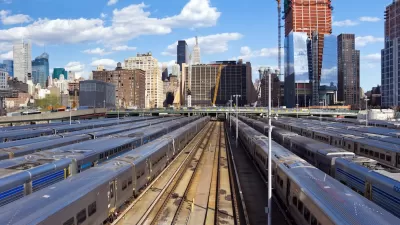Funding from a nonprofit initiative provides concrete measures to prevent displacement due to the construction of the Green Line in the Twin Cities.
Major infrastructure projects such as railway constructions often result in displacement of adjacent homes as well as negative impacts to surrounding businesses. As Jessica Leber reports, in building the Green Line light rail line to connect Minneapolis and St. Paul, everyone from the "government, nonprofits, businesses, and the local community" convened from the planning stage to avoid such outcomes.
Aptly named the Corridor of Opportunities project, the Twin Cities' collaborative effort was possible due to support from the nonprofit organization Living Cities and its Integration Initiative. Leber describes the goals of the initiative: "For the last three years, the initiative has provided a total of $85 million in grants, low-interest loans, and market-rate loans…To get everyone who has a stake in the city’s future working together to tackle a specific problem."
The Integration Initiative grants in conjunction with funding from the U.S. Department of Housing and Urban Development allowed the Corridor of Opportunities team to approach the transit-oriented project with the interest of the communities in mind: "[The team] created city staff jobs devoted to transit-oriented development and passed laws that changed the system, such as assigning greater weight to affordable housing projects located near transit" as well as "financing seven mixed-income and affordable housing development [sic]…about two dozen smaller projects and market research studies that would not only bolster the communities disrupted by construction and [sic] but also protect them from inevitably rising land values in the future." Other efforts included "fund[ing] facade and infrastructure improvements to help businesses improve their own look."
Leber notes the project's successful outcome: "Of 350 businesses that received assistance during the period of heavy construction, only four folded." Nine other cities are currently working with the Livable Cities' Integration Initiative.
FULL STORY: Linking Minneapolis And St. Paul With A Transit Project That Doesn't Destroy Communities

Alabama: Trump Terminates Settlements for Black Communities Harmed By Raw Sewage
Trump deemed the landmark civil rights agreement “illegal DEI and environmental justice policy.”

Study: Maui’s Plan to Convert Vacation Rentals to Long-Term Housing Could Cause Nearly $1 Billion Economic Loss
The plan would reduce visitor accommodation by 25% resulting in 1,900 jobs lost.

Planetizen Federal Action Tracker
A weekly monitor of how Trump’s orders and actions are impacting planners and planning in America.

Waymo Gets Permission to Map SF’s Market Street
If allowed to operate on the traffic-restricted street, Waymo’s autonomous taxis would have a leg up over ride-hailing competitors — and counter the city’s efforts to grow bike and pedestrian on the thoroughfare.

Parklet Symposium Highlights the Success of Shared Spaces
Parklets got a boost during the Covid-19 pandemic, when the concept was translated to outdoor dining programs that offered restaurants a lifeline during the shutdown.

Federal Homelessness Agency Places Entire Staff on Leave
The U.S. Interagency Council on Homelessness is the only federal agency dedicated to preventing and ending homelessness.
Urban Design for Planners 1: Software Tools
This six-course series explores essential urban design concepts using open source software and equips planners with the tools they need to participate fully in the urban design process.
Planning for Universal Design
Learn the tools for implementing Universal Design in planning regulations.
Caltrans
Smith Gee Studio
Institute for Housing and Urban Development Studies (IHS)
City of Grandview
Harvard GSD Executive Education
Toledo-Lucas County Plan Commissions
Salt Lake City
NYU Wagner Graduate School of Public Service





























